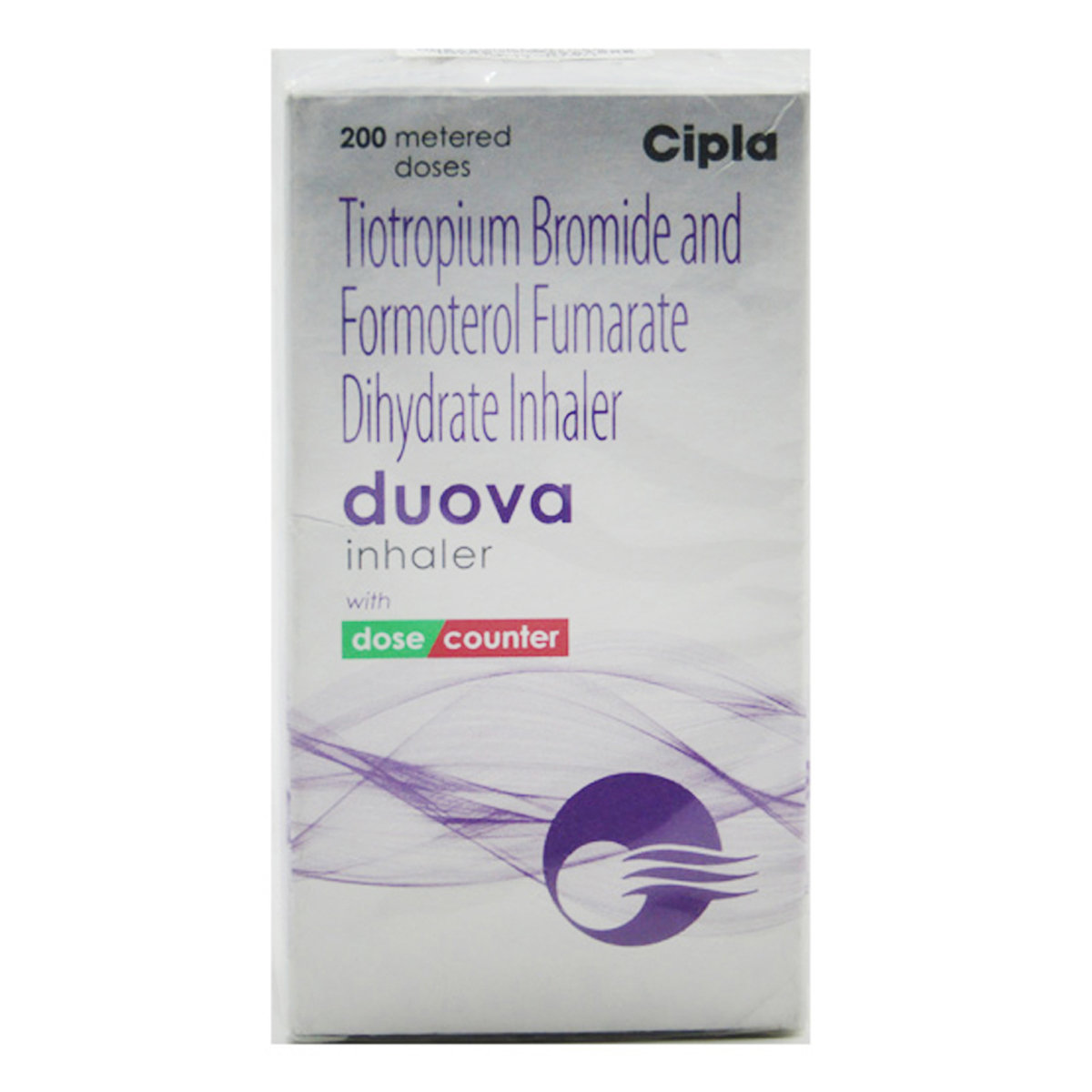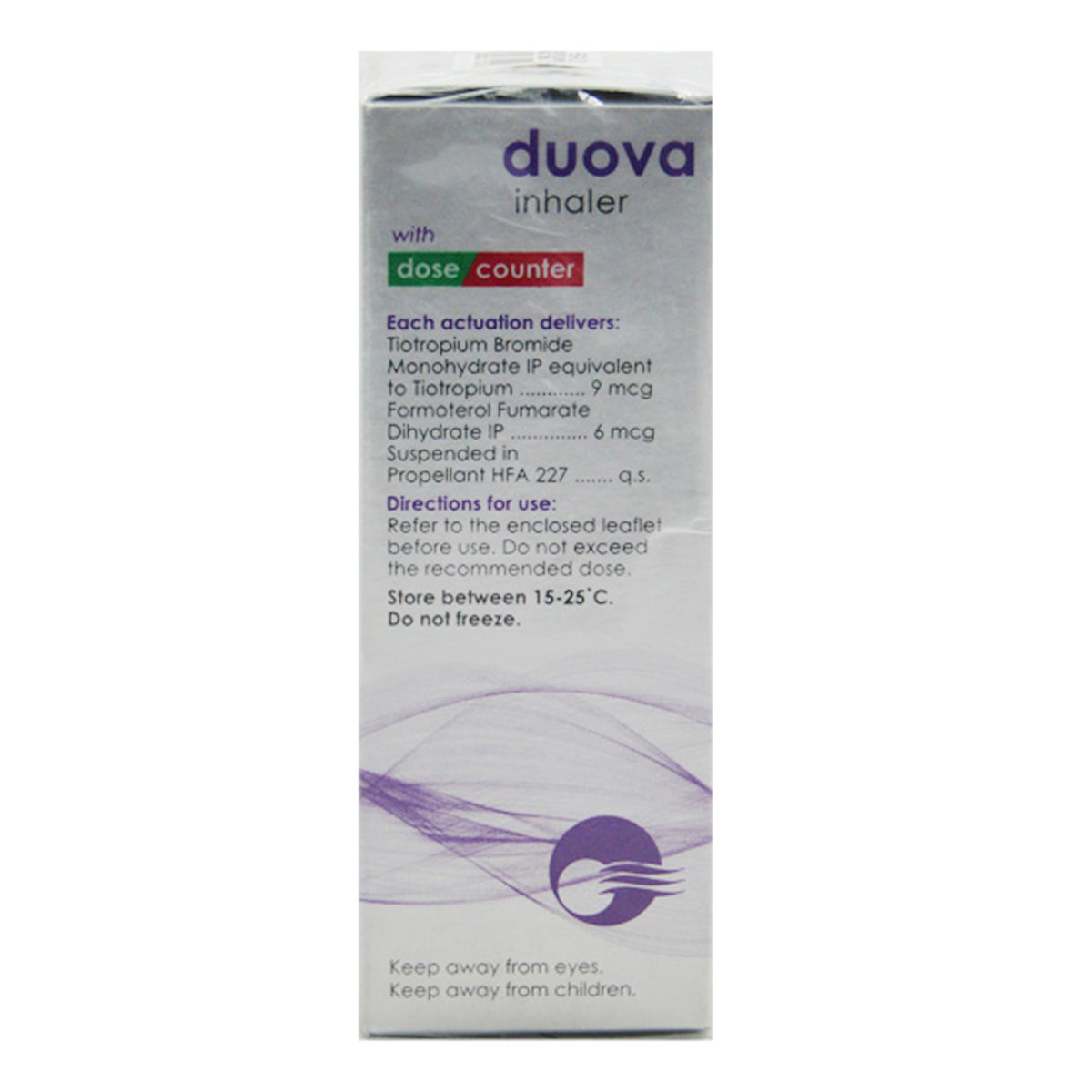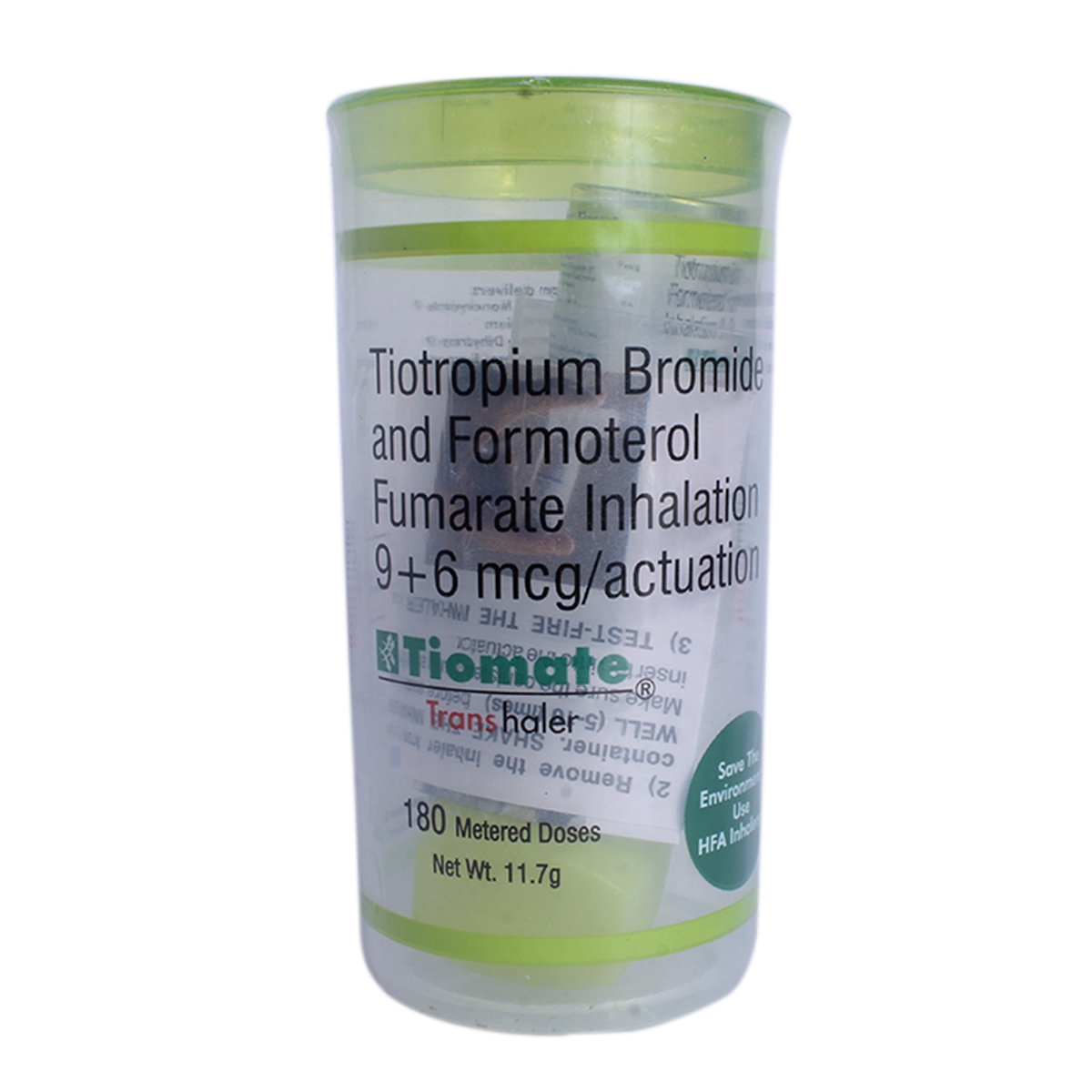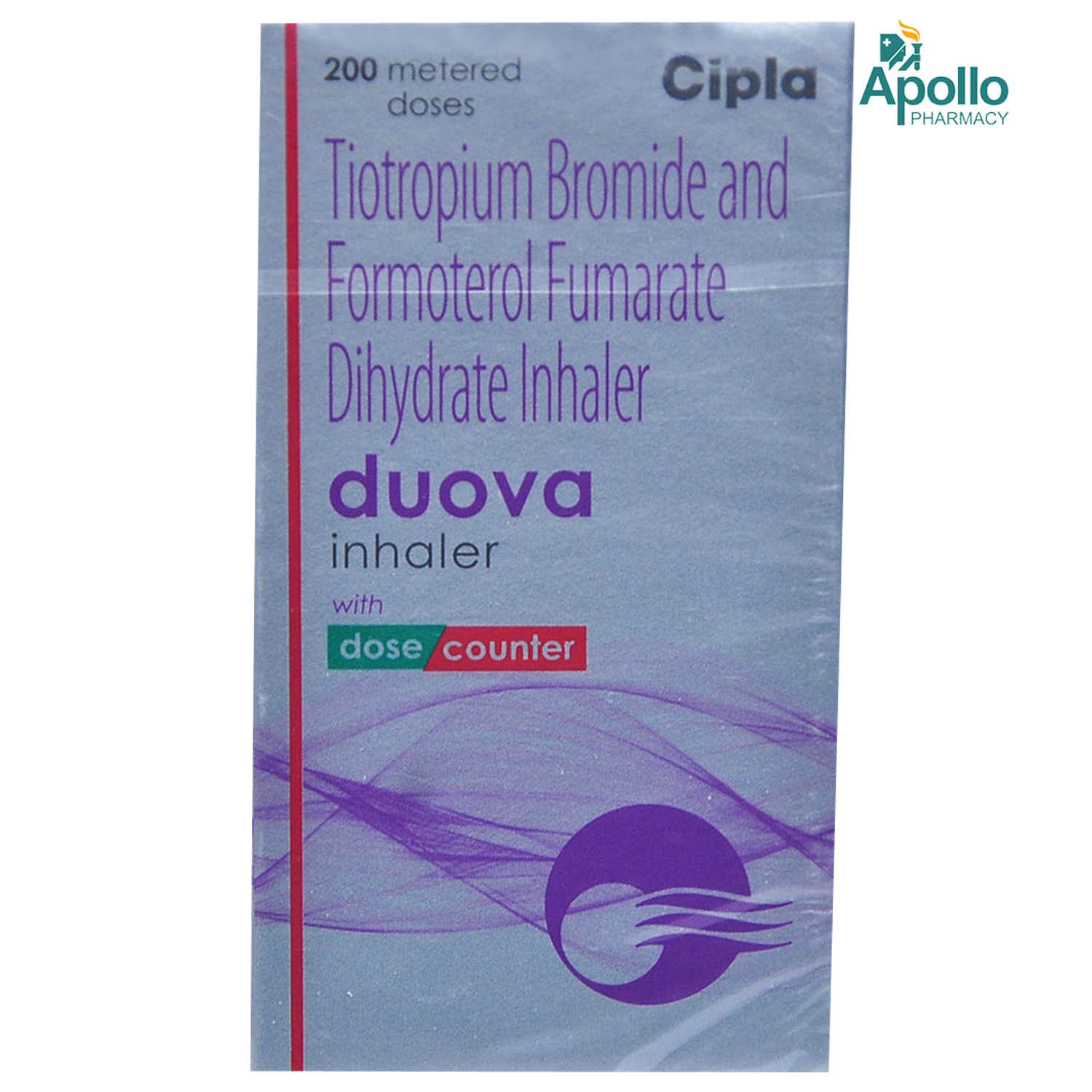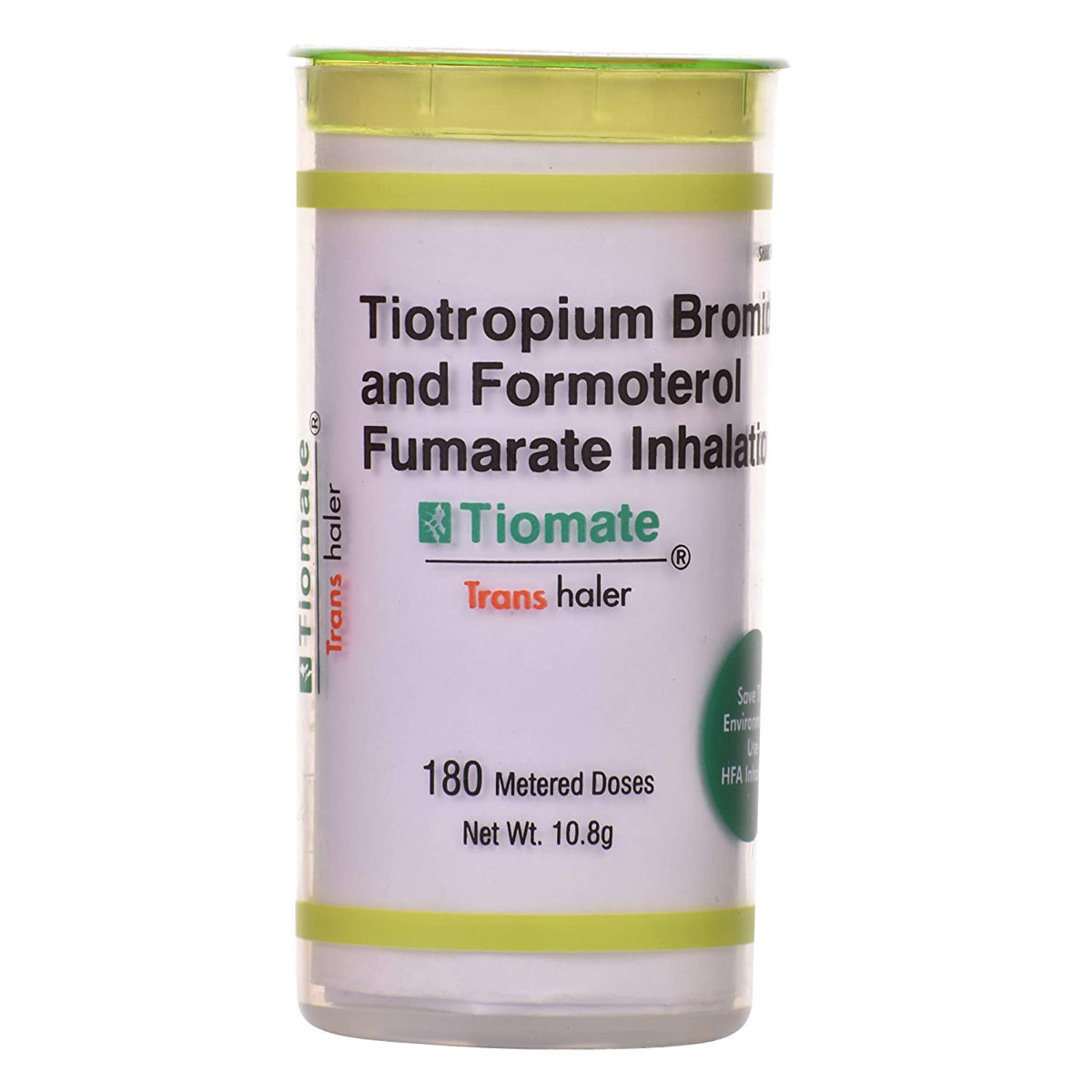Duova Inhaler 200 mdi
MRP ₹869.5
(Inclusive of all Taxes)
₹130.4 Cashback (15%)
Provide Delivery Location
Online payment accepted
 Prescription drug
Prescription drugWhats That
 20 people bought
20 people bought Composition :
Manufacturer/Marketer :
Consume Type :
Expires on or after :
Return Policy :
About Duova Inhaler 200 mdi
Duova Inhaler 200 mdi is a respiratory medication primarily used to treat and prevent asthma and chronic obstructive pulmonary diseases (COPD) like bronchitis (inflammation of the lining of your bronchial tubes) and emphysema (shortness of breath). Asthma is a chronic (long-term) respiratory condition in which airways narrow, swell and produce extra mucus, leading to difficulty breathing. COPD is a group of lung diseases that causes obstructed airflow from the lungs.
Duova Inhaler 200 mdi is a combination of Formoterol (bronchodilator) and Tiotropium (anticholinergic). Formoterol relaxes the muscles in the airways and increases airflow to the lungs. Formoterol makes breathing easier by widening the airways. Tiotropium works by blocking the receptors for acetylcholine released in the cholinergic nerve endings in the airways. Duova Inhaler 200 mdi relaxes and widens the airway's openings, making it easier for the air to get in and out of the lungs. Thereby, it helps to prevent asthma attacks.
Your doctor will advise on how often you need to use Duova Inhaler 200 mdi based on your medical condition. The common side effects of Duova Inhaler 200 mdi include nausea, vomiting, respiratory tract infection, headache, sore throat, cough, bone, muscle or joint pain, increased heart rate, chills, tiredness, and noisy breathing. Most of these side effects of Duova Inhaler 200 mdi do not require medical attention and gradually resolve over time. However, if the side effects are persistent, reach out to your doctor.
Do not use Duova Inhaler 200 mdi to treat sudden severe symptoms of asthma or as a rescue inhaler. Please check with your doctor if you are pregnant, breastfeeding, or taking other prescribed or non-prescribed medicines. Brief your medical history if you have heart, liver, or kidney diseases, high blood pressure, hypokalaemia (low potassium levels in the blood), aneurysm (swelling of an artery), pheochromocytoma (adrenal gland tumour), hyperadrenocorticism (high levels of cortisol), eye disorders like cataract and glaucoma, chickenpox or measles, immune system problem, seizure (fits), osteoporosis (weak and brittle bones) or diabetes.
Uses of Duova Inhaler 200 mdi
Directions for Use
Key Benefits
Duova Inhaler 200 mdi is used to treat and prevent respiratory disorders like asthma and chronic obstructive pulmonary disease (COPD). Duova Inhaler 200 mdi improves pulmonary function and effectively treats and prevents the worsening of emphysema (shortness of breath) and chronic bronchitis (inflammation of the lining of your bronchial tubes). Duova Inhaler 200 mdi contains Formoterol (bronchodilator) and Tiotropium (anticholinergic). Formoterol is a long-acting β₂ agonist and bronchodilator. It relaxes the muscles in the airways and increases airflow to the lungs. It makes breathing easier by widening the airways. Tiotropium works by blocking the receptors for acetylcholine which are released in the cholinergic nerve endings in the airways.
Storage
- Focus on eating nutrient-rich foods such as citrus fruits, spinach, ginger, garlic, turmeric, and fermented foods to improve immunity and general health.
- Drink plenty of water to stay hydrated, and think about taking probiotics, zinc, vitamin C, and vitamin D supplements.
- Adopt healthful practices such as leading a balanced lifestyle and remaining at home when necessary.
- Inform your doctor about the symptoms you're experiencing due to medication.
- Your doctor may adjust your treatment plan, which could include changing your medication, adding new medications, or offering advice on managing your symptoms.
- Practice good hygiene, including frequent handwashing, avoiding close contact with others, and avoiding sharing utensils or personal items.
- Stay hydrated by drinking plenty of fluids to help loosen and clear mucus from your nose, throat, and airways.
- Get plenty of rest and engage in stress-reducing activities to help your body recover. If your symptoms don't subside or worsen, consult your doctor for further guidance.
- Inform your doctor about dry mouth symptoms. They may adjust your medication regimen or prescribe additional medications to manage symptoms.
- Drink plenty of water throughout the day to help keep your mouth moist and alleviate dry mouth symptoms.
- Chew sugar-free gum or candies to increase saliva production and keep your mouth moisturized.
- Use saliva substitutes, such as mouthwashes or sprays, only if your doctor advises them to help moisturize your mouth and alleviate dry mouth symptoms.
- Avoid consuming smoking, alcohol, spicy or acidic foods, and other irritants that may aggravate dry mouth symptoms.
- Schedule regular dental check-ups to keep track of your oral health and handle any dry mouth issues as they arise.
- Drink warm fluids such as warm water with honey, broth, soup or herbal tea to soothe sore throat.
- Gargle with warm salt water.
- Suck on lozenges to increase the production of saliva and soothe your throat.
- Use a humidifier to soothe sore throat as it adds moisture to the air and makes breathing easier.
- Consult your doctor if you experience symptoms of sinusitis, such as nasal congestion, facial pain, or headaches, which may be triggered by your medication.
- Your doctor may adjust your treatment plan by changing your medication, adding new medications, or providing guidance on managing your sinusitis symptoms.
- Practice good hygiene, including frequent handwashing, avoiding close contact with others, and avoiding sharing utensils or personal items.
- If your doctor advises, you can use nasal decongestants or saline nasal sprays to help relieve nasal congestion and sinus pressure.
- To help your body recover, get plenty of rest, stay hydrated, and engage in stress-reducing activities. If your symptoms persist or worsen, consult your doctor for further guidance.
- Inform Your Doctor: Notify your doctor immediately about your diarrhoea symptoms. This allows them to adjust your medication or provide guidance on managing side effects.
- Stay Hydrated: Drink plenty of fluids to replace lost water and electrolytes. Choose water, clear broth, and electrolyte-rich drinks. Avoid carbonated or caffeinated beverages to effectively rehydrate your body.
- Follow a Bland Diet: Eat easy-to-digest foods to help firm up your stool and settle your stomach. Try incorporating bananas, rice, applesauce, toast, plain crackers, and boiled vegetables into your diet.
- Avoid Trigger Foods: Steer clear of foods that can worsen diarrhoea, such as spicy, fatty, or greasy foods, high-fibre foods, and dairy products (especially if you're lactose intolerant).
- Practice Good Hygiene: Maintain good hygiene to prevent the spread of infection. To stay healthy, wash your hands frequently, clean and disinfect surfaces regularly, and avoid exchanging personal belongings with others.
- Take Anti-Diarrheal Medications: If your doctor advises, anti-diarrheal medications such as loperamide might help manage diarrhoea symptoms. Always follow your doctor's directions.
- Keep track of your diarrhoea symptoms. If they don't get better or worse or are accompanied by severe stomach pain, blood, or dehydration signs (like extreme thirst or dark urine), seek medical help.
- Talk to your doctor about your back pain and potential medication substitutes or dose changes.
- Try yoga or Pilates and other mild stretching exercises to increase flexibility and strengthen your back muscles.
- To lessen the tension on your back, sit and stand upright and maintain proper posture.
- To alleviate discomfort and minimize inflammation, apply heat or cold packs to the afflicted area.
- Under your doctor's supervision, think about taking over-the-counter painkillers like acetaminophen or ibuprofen.
- Make ergonomic adjustments to your workspace and daily activities to reduce strain on your back.
- To handle tension that could make back pain worse, try stress-reduction methods like deep breathing or meditation.
- Use pillows and a supportive mattress to keep your spine in the right posture as you sleep.
- Back discomfort can worsen by bending, twisting, and heavy lifting.
- Speak with a physical therapist to create a customized training regimen to increase back strength and flexibility.
Drug Warnings
Special precautions should be taken in patients with a fungal, bacterial, parasitic, or viral infection and tuberculosis since nasal or inhaled corticosteroids can cause secondary infections. Duova Inhaler 200 mdi can cause a rise in blood glucose levels. Hence monitor your blood glucose levels regularly and inform your doctor if you already have diabetes before using Duova Inhaler 200 mdi. Duova Inhaler 200 mdi may affect the unborn baby during pregnancy. Please let your doctor know if you plan to become pregnant or are already pregnant, or if you are a lactating mother. Duova Inhaler 200 mdi is not recommended for children below five years of age.
Drug-Drug Interactions
Drug-Drug Interactions
Login/Sign Up
Co-administration of labetalol and Duova Inhaler 200 mdi together could decrease the effects of both medications.
How to manage the interaction:
Although taking Labetalol and Duova Inhaler 200 mdi together can result in an interaction, it can be taken if a doctor has prescribed it. However, if you experience any unusual symptoms contact a doctor immediately. Do not stop using any medications without talking to a doctor.
Using Duova Inhaler 200 mdi and Carvedilol together may reduce the effects of both medications.
How to manage the interaction:
Although there is an interaction between Duova Inhaler 200 mdi and Carvedilol, they can be taken together if prescribed by a doctor. Do not discontinue any medications without consulting a doctor.
Using Duova Inhaler 200 mdi together with metipranolol can reduce the effects of both medications.
How to manage the interaction:
Although there is an interaction between Duova Inhaler 200 mdi and metipranolol, they can be taken together if prescribed by your doctor. However, if you experience any unusual symptoms contact your doctor immediately. Do not stop using any medications without first talking to your doctor.
Taking ribociclib together with Duova Inhaler 200 mdi can increase the risk of an irregular heart rhythm
How to manage the interaction:
Co-administration of Duova Inhaler 200 mdi with Ribociclib can possibly result in an interaction, but it can be taken if your doctor has advised it. However, if you experience sudden dizziness, lightheadedness, fainting, or shortness of breath, contact your doctor right away. Do not stop using any medications without first talking to your doctor.
Using epinephrine together with Duova Inhaler 200 mdi may increase the risk of irregular heart rhythm.
How to manage the interaction:
Although taking Duova Inhaler 200 mdi and Epinephrine together can cause an interaction, it can be taken if your doctor has suggested it. However, if you experience any unusual symptoms contact your doctor immediately. Do not stop using any medications without first talking to your doctor.
Using Duova Inhaler 200 mdi with pindolol together could decrease the effects of both medications.
How to manage the interaction:
Although there is an interaction between Duova Inhaler 200 mdi and Pindolol, they can be taken together if prescribed by your doctor. However, if you experience any unusual symptoms contact your doctor immediately. Do not stop using any medications without first talking to your doctor.
Taking carteolol with Duova Inhaler 200 mdi can reduce the effects of both drugs.
How to manage the interaction:
Although there is an interaction between Carteolol and Duova Inhaler 200 mdi, they can be taken together if prescribed by a doctor. Do not discontinue any medications without consulting a doctor.
Taking timolol with Duova Inhaler 200 mdi could reduce the benefits of both medications because they have opposite effects on the body.
How to manage the interaction:
Although taking Duova Inhaler 200 mdi and timolol together can possibly result in an interaction, it can be taken if your doctor has advised it. However, if you experience any unusual symptoms, contact your doctor immediately. Do not stop using any medications without talking to your doctor.
Taking nadolol with Duova Inhaler 200 mdi together could decrease the effects of both medications.
How to manage the interaction:
There may be a possibility of interaction between Duova Inhaler 200 mdi and Nadolol, but it can be taken if prescribed by a doctor. However, if you experience any unusual symptoms contact your doctor immediately. Do not stop using any medications without first talking to your doctor.
Using Duova Inhaler 200 mdi together with penbutolol can reduce the effect of both medications.
How to manage the interaction:
There may be a possibility of interaction between Penbutolol and Duova Inhaler 200 mdi, but it can be taken if prescribed by a doctor. However, if you experience any unusual symptoms contact your doctor immediately. Do not stop using any medications without first talking to your doctor.
Drug-Food Interactions
Drug-Food Interactions
Login/Sign Up
Diet & Lifestyle Advise
- Know your triggers like allergens, such as pollen, dust, and food items that make your asthma severe.
- Quit smoking and avoid passive smoking. Smoking also reduces the effectiveness of the medicine.
- Eat a healthy diet and exercise regularly to strengthen your breathing muscles and boost your immune system.
- Learning breathing exercises will help you move more air in and out of your lungs.
Side Effects of Duova Inhaler 200 mdi
- Nausea
- Vomiting
- Respiratory tract infection
- Headache
- Sore throat
- Cough
- Dry mouth
- Constipation
Habit Forming
Therapeutic Class
All Substitutes & Brand Comparisons
RX
Out of StockAirtio F Inhaler 150 mdi
Glenmark Pharmaceuticals Ltd
₹86
(₹0.52/ 1MDI)
86% CHEAPERRX
Out of StockIbitrop Nexhaler 240 mdi
Indiabulls Pharmaceuticals Pvt Ltd
₹560
(₹2.1/ 1MDI)
46% CHEAPERRX
Aerotrop F Inhalaer 180 mdi
Jubilant Lifesciences Ltd
₹510
(₹2.49/ 1MDI)
36% CHEAPER
Drug-Diseases Interactions
Drug-Diseases Interactions
Login/Sign Up
FAQs
Drug-Drug Interactions Checker List
- BECLOMETASONE
- MOMETASONE
- BUDESONIDE
- IPRATROPIUM
- SALMETEROL
- VILANTEROL
- ALBUTEROL
- METOPROLOL
- SOTALOL
Special Advise
- It is advised to undergo a blood examination to keep a check on your potassium levels since Duova Inhaler 200 mdi can cause low potassium levels in the blood (hypokalaemia).
- Regularly monitor your blood sugar levels while using Duova Inhaler 200 mdi since bronchodilators like Formoterol can cause low blood glucose levels.
- Consult your diabetologist if you have diabetes before using Duova Inhaler 200 mdi so that your insulin or other diabetic medication can be adjusted accordingly to maintain your blood sugar levels.
Disease/Condition Glossary
Asthma: It is a breathing problem in which airways narrow, swell and produce extra mucus, leading to difficulty breathing.
Chronic obstructive pulmonary disease (COPD): It is a group of lung diseases that block airflow and make breathing difficult. The most common COPD is emphysema and chronic bronchitis.
Emphysema: It is a lung condition that causes shortness of breath.
Chronic Bronchitis: A lung disease associated with inflammation of the lining of bronchial tubes, which carry air to and from the lungs.

Have a query?
Alcohol
Safe if prescribed
Avoid drinking alcohol while taking this medicine, as it can worsen your side effects.
Pregnancy
Consult your doctor
Duova Inhaler 200 mdi is not recommended to use during pregnancy since it may have harmful effects on the unborn baby. Please consult your doctor if you are planning to conceive or are already pregnant before starting Duova Inhaler 200 mdi.
Breast Feeding
Consult your doctor
It is not known if this drug passes into breast milk. Consult your doctor before breastfeeding.
Driving
Safe if prescribed
Do not drive or operate machinery if you experience drowsiness and increased/uneven heart rate while using Duova Inhaler 200 mdi. This may affect your ability to drive. Seek medical attention if the symptoms persist longer.
Liver
Consult your doctor
Duova Inhaler 200 mdi should be used with caution in patients with liver diseases. Let your doctor know if you have any history of liver diseases or hepatic impairment. Your doctor will weigh the benefits and potential risks before prescribing Duova Inhaler 200 mdi.
Kidney
Consult your doctor
Duova Inhaler 200 mdi should be used with caution in patients with kidney diseases. Let your doctor know if you have any history of kidney diseases. Your doctor will weigh the benefits and potential risks before prescribing Duova Inhaler 200 mdi.
Children
Safe if prescribed
Duova Inhaler 200 mdi is not recommended for use in children less than five years of age. The dose may have to be adjusted by your doctor depending on the condition of the child's disease and age.

